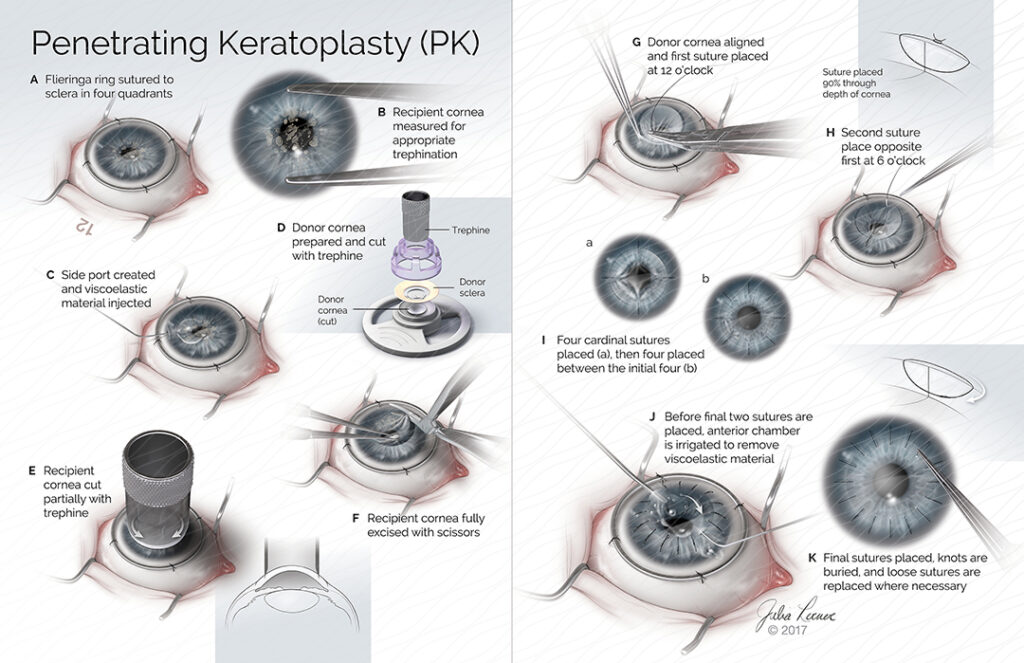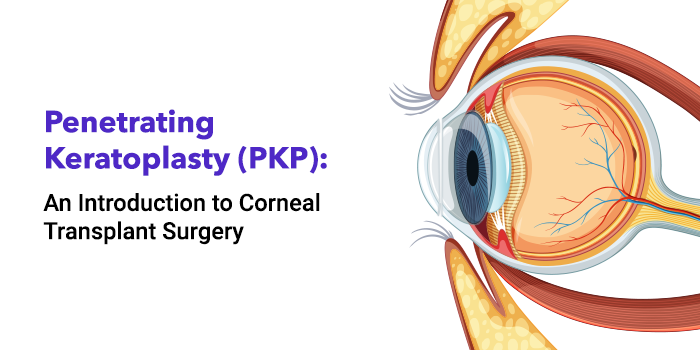Penetrating Keratoplasty (PK), a surgical treatment offered at the Khanna Vision Institute, is a highly effective option for individuals with advanced keratoconus. This procedure involves the replacement of the central portion of the patient’s cornea with a healthy donor cornea, effectively addressing the irregular shape and thinning of the cornea associated with keratoconus.
The Khanna Vision Institute, led by renowned corneal specialist Dr. Rajesh Khanna, has extensive experience in performing Penetrating Keratoplasty. Their skilled team utilizes the latest surgical techniques and technologies to ensure optimal outcomes for their patients. By replacing the damaged corneal tissue with a clear, well-shaped donor cornea, PK can significantly improve visual acuity, reduce astigmatism, and provide long-lasting visual rehabilitation for those suffering from advanced keratoconus.

Indications
Penetrating Keratoplasty is indicated for patients with:
Advanced Keratoconus: Particularly when corneal scarring or extreme thinning is present.
Corneal Scarring: Due to infections, trauma, or other causes that affect the full thickness of the cornea.
Corneal Dystrophies: Such as Fuchs’ endothelial dystrophy, affecting all layers of the cornea.
Severe Corneal Edema: When other treatments have failed.
Failed Previous Corneal Transplant: When a previous transplant has failed and needs to be replaced.
Procedure
Preoperative Evaluation: A thorough eye examination, including corneal topography and pachymetry, is performed to assess the extent of corneal damage and plan the surgery.
Anesthesia: This procedure is usually performed under local or general anesthesia.
Donor Cornea Preparation: A donor cornea is selected, screened, and prepared for transplantation. The donor corneal button is sized to match the recipient’s corneal bed.
Removal of Diseased Cornea: The diseased cornea is removed using a trephine, a circular cutting instrument that creates a precise, circular incision.
Donor Cornea Placement: The donor corneal button is placed into the recipient’s eye, replacing the removed corneal tissue.
Suturing: The donor cornea is sutured into place using fine, continuous or interrupted sutures, ensuring proper alignment and stability.
Benefits
Visual Improvement: Significant improvement in vision can be achieved, especially in cases of advanced keratoconus or severe corneal scarring.
Wide Applicability: Effective for a broad range of corneal diseases affecting all layers of the cornea.
Established Procedure: PK is a well-established procedure with a long history of success.

Risks and Considerations
Graft Rejection: There is a risk of immune rejection of the donor cornea, which can lead to graft failure.
Astigmatism: Postoperative astigmatism is common and may require additional treatments, such as glasses, contact lenses, or further surgery.
Endothelial Cell Loss: Loss of endothelial cells over time can affect longevity and graft clarity.
Extended Recovery: Visual recovery can take several months to a year, and sutures may need to be adjusted or removed during this period.
Postoperative Care
Medications: Patients are prescribed antibiotic and steroid eye drops to prevent infection and control inflammation.
Follow-Up: Regular follow-up visits are essential to monitor for signs of graft rejection, infection, and other complications.
Suture Management: Sutures may need to be removed or adjusted over time to ensure optimal corneal shape and vision.
Visual Rehabilitation: Glasses or contact lenses may be needed to correct postoperative refractive errors, including astigmatism.
Patients undergoing Penetrating Keratoplasty at the Khanna Vision Institute can expect a comprehensive and personalized approach to their care. The institute’s state-of-the-art facilities, combined with the expertise of its ophthalmologists, ensure a seamless surgical experience and a smooth recovery process. With a commitment to patient satisfaction and a focus on delivering exceptional results, the Khanna Vision Institute has established itself as a leading provider of Penetrating Keratoplasty for the treatment of keratoconus.